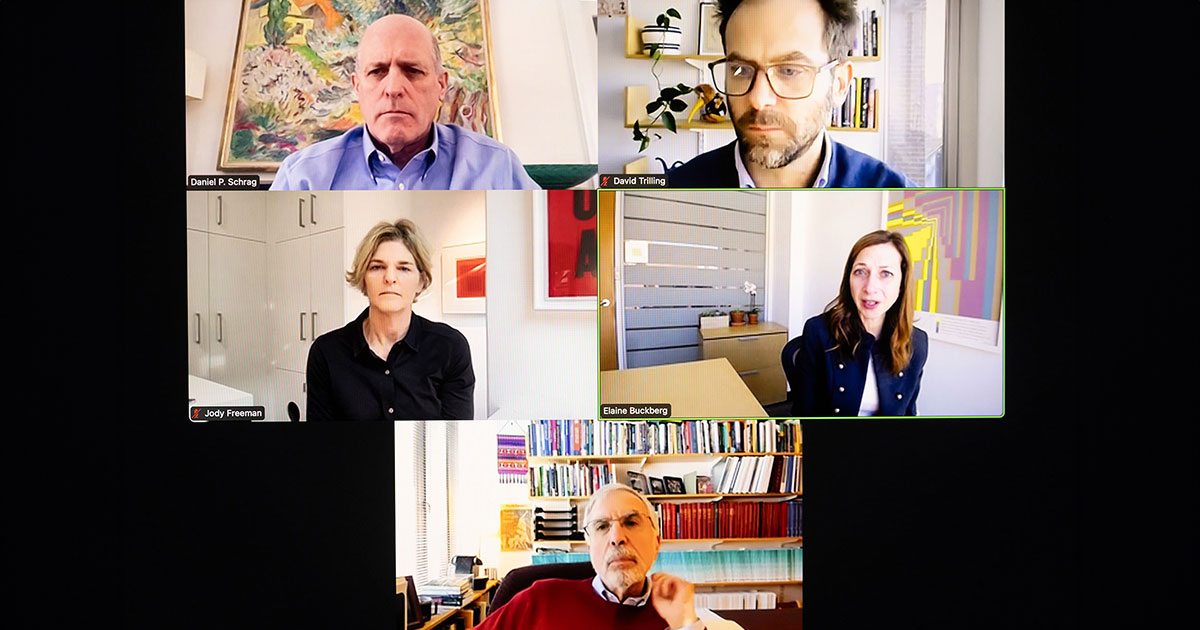Actions by the Trump administration will almost certainly slow the shift from fossil fuels to cleaner energy sources, but they won’t halt it, and energy innovation will continue abroad if not in the U.S., Harvard climate experts say.
The new president has moved swiftly to undo the climate efforts of his predecessors, including through an executive order initiating the yearlong process of withdrawing the U.S. from the Paris Climate Agreement, which provides a framework for nations to cooperatively attack warming. The administration has paused permits for new wind power installations, indicated it would remove incentives for electric vehicle purchases, and is attempting to claw back funds awarded to contractors under the 2022 Inflation Reduction Act, which included significant climate change provisions. It has also aggressively moved to reduce staff in federal agencies, including those tasked with fighting climate change.
“We are living in a very uncertain time and a somewhat dark time,” said Daniel Schrag, Sturgis Hooper Professor of Geology, professor of environmental science, and engineering and professor of public policy. “From my perspective, there are existential questions: Will the Trump administration try to block all funding for all climate science? Will climate science happen in the U.S. with federal funding anymore?”
Schrag was speaking Wednesday as moderator of a conversation organized by the Salata Institute for Climate and Sustainability. He was joined at the event by Elaine Buckberg, a senior fellow at the Salata Institute and former chief economist for General Motors; Jody Freeman, the Archibald Cox Professor of Law and director of Harvard Law’s Environmental and Energy Law Program; and Robert Stavins, A.J. Meyer Professor of Energy and Economic Development at the Kennedy School.
An appropriate analogy in recent U.S. history for climate policy may be the path taken by the Affordable Care Act, Buckberg said. Passed in 2010 after highly partisan debate, the ACA survived years of court cases and intense political warfare, emerging with some provisions altered but largely intact. Today it supports health insurance for some 45 million Americans while rancor over the law has eased.
“If you look at, for example, the EV transition — though I think this would apply to solar and other things — I think it’s simply irreversible,” Buckberg said. “You’re talking about changing timing. I think it’s irreversible because it’s a superior technology that’s on a path to becoming less expensive. There is also global regulatory pressure. It is a global auto industry. You cannot stop that progress. What you may impact is what’s the mix in sales in the U.S. in the next few years and who is selling them.”
Freeman suggested that the administration will target California’s exemption from federal vehicle pollution standards as a way to stop the state from setting more stringent standards that favor adoption of electric vehicles. It also appears, she said, that the president will target the “endangerment finding,” a 2009 EPA ruling that underlies the authority of government agencies to regulate carbon dioxide and other greenhouse gases.
“This is a swinging-for-the-fences, maximalist, hyperaggressive strategy that the administration is clearly adopting,” Freeman said. “So this is a maximalist, Article II, presidential-authority set of actions.”
She added: “The way that is unfolding is just stunning, with tremendous harm to things that people care about. But we haven’t yet seen the public health impacts and the day-to-day impacts of slashing and burning through the federal government.”
Addressing the U.S. withdrawal from the Paris climate deal, Stavins said that the global impact of the decision remains to be seen. For now, the absence of U.S. pressure will reduce momentum toward more ambitious goals by other nations, he said. Also, the likelihood that U.S. climate finance payments to developing countries will cease may affect the contributions of other governments. Already, Stavins noted, there’s evidence that three other countries, Indonesia, Argentina, and New Zealand, are considering withdrawing from Paris.
If enough countries pull out, he said, the Paris deal could collapse. While that would stall global advances in the near term, it might create new opportunities for swifter action, he said. The slow pace of progress under Paris has drawn criticism, and a follow-up accord with fewer nations, like the G20 — which represents a large part of the global economy and the vast majority of greenhouse gas emissions — might lead to faster, more substantive change, Stavins said.
“It’s possible that if the Paris agreement did actually collapse, that we would see countries turning to a different approach that might be more effective.”
Clearly, the climate problem isn’t going away, and despite the shift in U.S. policy, other nations — and global industries — will press forward, the panelists agreed.
“I’m not ready to throw in the towel and say it’s all done,” Schrag said. “We have lots and lots of work ahead of us and this effort on climate change doesn’t stop no matter what happens in the next few years of the Trump administration.”
Source link

